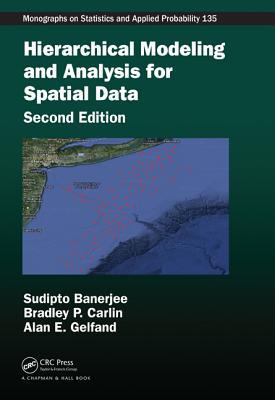Keep Up to Date with the Evolving Landscape of Space and Space-Time Data Analysis and Modeling
Since the publication of the first edition, the statistical landscape has substantially changed for analyzing space and space-time data. More than twice the size of its predecessor, Hierarchical Modeling and Analysis for Spatial Data, Second Edition reflects the major growth in spatial statistics as both a research area and an area of application.
New to the Second Edition
- New chapter on spatial point patterns developed primarily from a modeling perspective
- New chapter on big data that shows how the predictive process handles reasonably large datasets
- New chapter on spatial and spatiotemporal gradient modeling that incorporates recent developments in spatial boundary analysis and wombling
- New chapter on the theoretical aspects of geostatistical (point-referenced) modeling
- Greatly expanded chapters on methods for multivariate and spatiotemporal modeling
- New special topics sections on data fusion/assimilation and spatial analysis for data on extremes
- Double the number of exercises
- Many more color figures integrated throughout the text
- Updated computational aspects, including the latest version of WinBUGS, the new flexible spBayes software, and assorted R packages
The Only Comprehensive Treatment of the Theory, Methods, and Software
This second edition continues to provide a complete treatment of the theory, methods, and application of hierarchical modeling for spatial and spatiotemporal data. It tackles current challenges in handling this type of data, with increased emphasis on observational data, big data, and the upsurge of associated software tools. The authors also explore important application domains, including environmental science, forestry, public health, and real estate.
